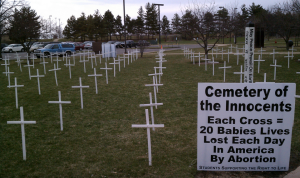By Matthew Wagner, Education Director
Editor’s Note: This post is a continuation of a series of about “Pro-Life Heroes”…individuals who are making a difference for the pro-life movement in their communities. One of the things I’ve always been impressed with is how there are so many different talents within the pro-life movement. Jess Socrates, a pathologist in York PA has one such unique program to show the humanity of the pre-born child. Enjoy his story and stay tuned in the coming weeks for future “Pro-Life Heroes” blogs. If you know of someone we should talk to who is making a difference for those who can’t defend themselves, email lifelines@paprolife.org.
Matt: Tell me your background. Where did you grow up and what brought you to the United States?
Jess: I was born in the Philippines, a cradle Catholic. The majority of Filipinos are Catholic. I did all my education in the University of the Philippines where both of my parents were faculty. It was the only way all of us nine siblings could get an education. I immigrated to the US in 1976 to join my family. There is a longer story to this that has something to do with Martial Law in the Philippines. I initially did not want to come here but eventually decided that it was the best thing to do for my safety and future. No regrets. I did my Pathology residency at York Hospital where abortions were performed. The first time I had a fully-formed saline aborted baby in my hands, I asked my assistant what I should do with the baby next. She came over with a garbage can (red bag) and directed me to throw the dead baby in the trash. This was an experience that I can never forget. All aborted and miscarried children ended up in the garbage can – to be incinerated with the rest of the hospital’s biological waste. I told myself that I will not let this happen wherever I would work in the future.
Matt: Why is the sanctity of all human life so important to you?
Jess: Every person deserves to live his natural life. As a physician who took the Hippocratic Oath, which includes the phrase “I will not give to a woman a pessary to cause abortion,” I am bound to respect the sanctity of human life before birth. Natural law dictates that no one can take life away from another.
Matt: Describe for me how you exercise respect for human life and how you got started doing this.
Jess: Every human is a living being should be allowed to live. No one should kill anyone regardless of a person’s age. Shortly after I started working at Hanover Hospital in 1980, I approached the administration and presented to them a simple plan. Instead of discarding remains of miscarried children who do not get a fetal death certificate in the red bag, I, the pathologist, would save these and eventually find a proper means to bury them. The hospital checked with the lawyers and approved my proposal. (In Pennsylvania, children miscarried before 16 weeks of gestation do not get a “fetal death certificate.” So, in the eyes of the law, they never existed.) I saved all remains in formaldehyde after removing all identification. I looked for opportunities to bury these children properly. In a period of over thirty years, three groups of miscarried children were buried. The first children were buried in a Catholic Church graveyard; the second batch were placed in the coffin of a deceased with consent from family; the third were buried in the grounds of another Catholic church. Eventually, the hospital adopted a formalized program as described.
Matt: How long have you been doing this?
Jess: Thirty-eight years
Matt: How many babies would you say you have buried over the years?
Jess: Approximately? At least 100
Matt: When you bury the babies, do you notify their next of kin?
Jess: YES. The parents are first asked if they are willing for the hospital to bury their deceased child’s remains. They sign a consent form. Their names and contact information are saved so that they can be informed when their child will be buried. The funeral services are open to immediate family.
Matt: What is your vision for this program?
Jess: All miscarried (and aborted) children should be given a proper funeral. Shared burial should be offered to parents who are considering abortion. The remains of their aborted child can be buried as well. Without getting into the politics, this program demonstrates to everyone that these children we are burying are people too. When the public becomes aware of this, their false perception that a baby in the womb is nothing but a piece of tissue will change. I feel that if this is done all throughout the country (or world for that matter) we will abolish abortion forever.
Matt: How would you suggest others who may be interested in doing something similar to what you are doing get started?
Jess: Determine if a local hospital buries miscarried children. If not, then there is an opportunity to get into this program. In my experience, it is easy to get the support of the community (funeral homes, florists, and cemetery). My hospital does not spend a single cent to get this program going. Everything is donated. It is not difficult either to get organizations and volunteers involved. Because these remains are very small, a coffin and a funeral can be shared by all hospitals in the vicinity.

